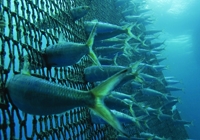Environmental and Social Criteria for Allocating Access to Fisheries Resources

BRUSSELS – A new report released today by OCEAN2012 and Meridian Prime highlights environmental and social criteria that are successfully employed in allocating access to fisheries resources.
The report, Environmental and Social Criteria for Allocating Access to Fisheries Resources, offers case studies from ten different fisheries in Europe and around the world to show how reform of the Common Fisheries Policy (CFP) could be modeled.
Specifically, the report recommends:
- Selectivity. Different fishing methods result in different amounts of by-catch. Fishers using fishing methods with low by-catch should be given priority access to the available resources;
- Environmental impact – The impact of different gears and practices on the environment, including damage to the seabed and pollution, vary widely. Fishers using less destructive fishing methods should be given priorityaccess;
- Energy consumption – Some gear and vessel types, like some trawlers and seiners, require enormous amounts of energy compared to the fish they catch. Fishers using vessels and fishing methods that consume less energy per tonne of fish caught should be given priority access;
- Employment and working conditions – Fishing methods that provide more employment opportunities and have less environmental damage should be given priority access. Working conditions should comply with relevant international standards, notably the 2007 International Labour Organisation (ILO) Work in Fishing Convention;
- History of compliance – Past compliance with the rules of the CFP by fishers as well as EU Member States should be considered when allocating access to fishing rights.
"The right to fish in EU waters should be granted to those who contribute to the goal of ending overfishing," said Markus Knigge of the Pew Environment Group and OCEAN2012. "Allocating access to commonly held fisheries resources through the implementation of strict environmental and social criteria is an effective way of doing this."
On April 22, 2009, the European Commission launched a reform of the CFP. As part of a broader, stepwise approach to returning EU fisheries to a sustainable footing, OCEAN2012 suggested replacing, or at least enhancing, relative stability with a system of allocating access to fisheries based on an explicit consideration of certain criteria. The allocation system should contribute to environmental sustainability, a more equitable distribution of access to available fishing resources and a culture of compliance.
The fish that inhabit the EU’s waters are a commons resource. EU Member State governments are their custodians. They have a responsibility to the public and to fishing communities to restore the health of these stocks and keep the communities viable. The ten examined fisheries in this report clearly demonstrate the feasibility of basing access to fisheries resources on environmental and social criteria. Markus Knigge
The fisheries studied in the report are the Georges Bank cod fishery in Cape Cod USA; the toothfish fishery in South Georgia; trawling in Koster-Väderö fjord, Sweden; the Prud’homies fishery Languedoc-Roussillon, France; the Os Miñarzos fishery in Lira-Carnota Spain; Creel Fishing in Loch Torridon Scotland; the South-West Mackerel Box fishery in England; The Integrated Fisheries Foundation (IFF) in the Wadden Sea, Netherlands; traditional island lobster fishing in the Torres Strait, Papua New Guinea and Australia; and the hake handline, traditional linefish, west coast rock lobster and abalone fisheries in the Western Cape, South Africa.
Note to the Editor:
1. OCEAN2012 is an alliance of organisations dedicated to transforming European Fisheries Policy to stop overfishing, end destructive fishing practices and deliver fair and equitable use of healthy fish stocks.
OCEAN2012 was initiated, and is co-ordinated, by the Pew Environment Group, the conservation arm of The Pew Charitable Trusts, a non-governmental organisation working to end overfishing in the world´s oceans.
The founding members of OCEAN2012 are the Coalition for Fair Fisheries Arrangements (CFFA), the Fisheries Secretariat (FISH), nef (new economics foundation), the Pew Environment Group and Seas At Risk (SAR).
Environmental and Social Criteria for Allocating Access to Fisheries Resources - report commissioned by the Pew Environment Group, on behalf of OCEAN2012, written by Chris Grieve, Executive Director, Meridian Prime.
OCEAN2012 letter to the European Parliament's Fisheries Committee, May 11 2010






